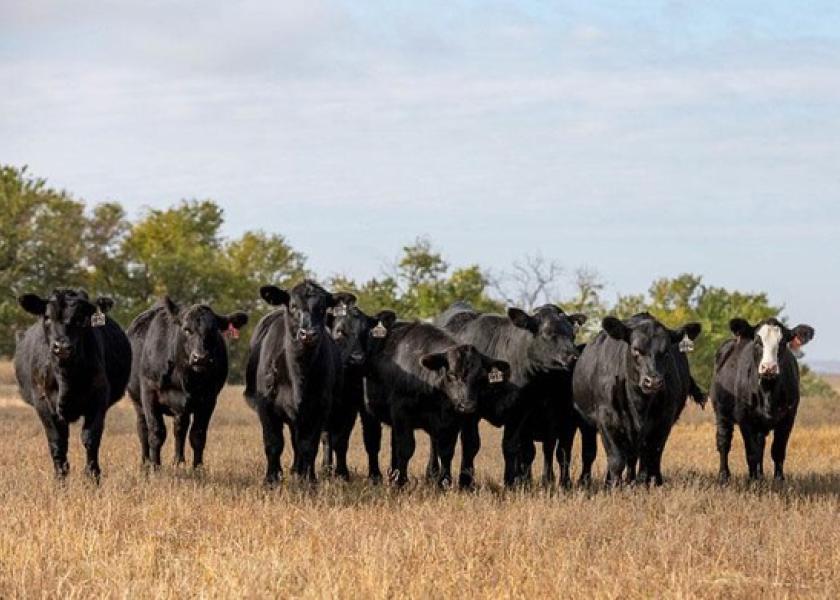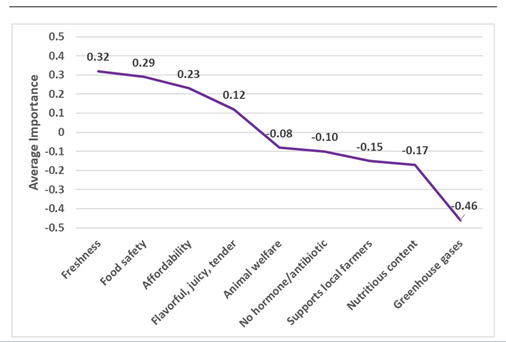Consumer Ranking of Beef Sustainability Attributes

Beef sustainability continues to be a hot topic with the general consumer being the target of information campaigns from both sides. News stories and social media posts abound with information about how much greenhouse gas emissions beef cattle produce and how much water it takes to produce one pound of beef. On the other side, beef advocates promote the upcycling nature of beef production and the benefits of cattle on rangeland and ecosystem health. The average consumer does not have the knowledge and experience of the beef industry to sort these things out. How do consumers view beef production and what sustainability attributes are important to them?
A recent consumer survey funded by the Kansas Beef Council asked several questions about which beef attributes are most important with particular focus on sustainability attributes. Consumers were asked to rank the importance of attributes like flavor, nutrition, affordability, animal welfare, antibiotic/hormone use, local beef, employee compensation, land and water conservation, and greenhouse gas emissions among others. Attributes ranked above average (greater than 0) by consumers from across the United States were the traditional attributes of freshness, food safety, affordability, and flavor (Figure 1). Among all the buzz about beef sustainability, these attributes are still the most important to the greatest proportion of consumers.
Among beef sustainability attributes there was little difference in ranking with most attributes slightly below average in importance, but all of these were less important than typical attributes of the beef eating experience. Of the sustainability attributes, animal welfare and no added hormones or antibiotics were ranked the most important. This is similar to other consumer surveys, where animal welfare and no antibiotics are somewhat synonymous with sustainability in the mind of the consumer. Thus, continuing to improve animal husbandry and welfare is important for the beef industry, as well as continuing to communicate this to consumers.
One of the surprising results was the low importance of nutritional value of beef. Beef is a good source of several vitamins and minerals and high-quality protein. In fact, beef is very nutrient dense meaning that the nutrient (i.e., vitamin, mineral, protein) to calorie ratio is high. Other foods require consuming many more calories to get the same amount of protein, iron, zinc, etc. as one serving of beef. This is an important aspect of beef sustainability in that cattle upcycle low-quality feeds into a highly nutritious product for human consumption. The low ranking of nutritional value of beef may indicate that further consumer education is necessary to overcome the past misrepresentation of red meat consumption on human health.
Probably the most surprising result was the very low ranking of greenhouse gas emissions from beef. It seems that most of the negative news stories and social media posts about beef focus on the negative impact of the greenhouse gas emissions, particularly methane. The reasons consumers ranked greenhouse gas emissions so low are unclear from this survey. Maybe the average consumer doesn’t consume much information about beef’s carbon footprint, maybe they understand that cattle are just replacing bison in the natural ecosystem and that the impact of beef cattle is relatively small, or maybe climate change is not that important to them. Other surveys have indicated that only 23% of consumers ranked greenhouse gas emissions as the most important meat sustainability topic compared to 52 and 57% ranking animal welfare and no hormone/antibiotics as the most important. Thus, it appears there are attributes of beef production that are more important to consumers than greenhouse gas emissions.
Consumers do care about beef sustainability attributes but not at the expense of freshness, flavor, food safety and price. However, freshness, flavor, safety, and price were not the most important to 100% of consumers and sustainability attributes were important to a subset of consumers. The beef industry needs to continue to improve sustainability while educating consumers on past achievements and current progress to increase demand, but the improvement cannot come at the expense of beef freshness, flavor, safety, and price otherwise beef demand may have a net decrease.

The average importance ranking of beef attributes by nationwide consumers. An average ranking of zero means that an equal number of consumers ranked that attribute as most and least important.







